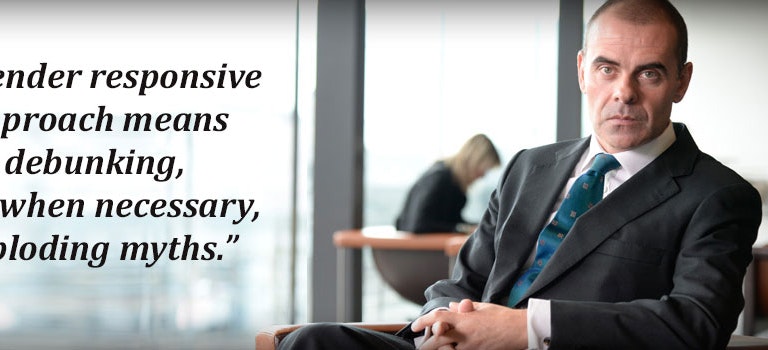Dr Khalid Koser, Executive Director GCERF, and GGC Champion
Kristina Wintermeier, GGC Focal Point, GCERF
The Geneva community has embraced the Geneva Gender Champions Network as an important initiative committed to, among other things, moving beyond the all-male panels that have dominated Geneva-based public discussions. As Executive Director of the Global Community Engagement and Resilience Fund (GCERF), I am proud to be a Geneva Gender Champion. To this end, GCERF renews its commitment to organize and participate in only panels that have gender parity; and commits to continue to make gender equality principles a fundamental part of our operational and institutional policies.
In addition, the Geneva Gender Champions Network has inspired GCERF not only to identify, but also harness the full potential of the men and women within the local communities we support. GCERF is a public-private partnership that funds local initiatives to build community resilience to violent extremism. GCERF was established to fill a funding gap. We rely on local communities who are on the frontline to identify: what drives violent extremism in their communities; how to dissuade individuals from succumbing to the appeals of violent extremist groups; and how they can achieve lasting resilience.
Across GCERF’s three pilot countries, (Bangladesh, Mali, and Nigeria), a significant proportion of the initiatives identified by local communities are focused on women and girls. Broadly, they can be grouped in three categories. First, they raise awareness of the dangers of violent extremism, for example by training mothers, teachers, and religious leaders to spot the early signs of radicalisation to violence. Second, they mobilize action against violent extremist threats, for example by empowering women who have significant roles in their families and communities and amplifying their voices and access to networks and resources. Finally, they provide alternatives to violent extremism, for example by creating income-generating activities, training women in goods production, and linking women’s groups with local financial institutions. Because the drivers of radicalization to violent extremism are specific to each individual, adopting and ensuring a gendered approach in the design, implementation, monitoring, and evaluation of GCERF projects is the best way to ensure success.
So what specifically does being gender responsive in the field of preventing violent extremism (PVE) look like? GCERF has identified at least three ways in which the international community should champion a gender perspective in PVE.
First, it means recognizing that all men and women have different and differentiated roles as victims, perpetrators, enablers and most importantly, as change agents. There is invariably a difference in how the effects of violent extremism are felt among and between genders. Understanding this can help the way in which donors, civil society, and even the private sector can tailor their approach in engaging with and empowering local communities.
Second, a gender responsive approach to preventing violent extremism means acknowledging that different people have different understandings of gender. Understanding and respecting cultural norms, whilst ensuring that GCERF funding is not deepening or perpetuating gender inequalities, is fundamental to our success in engaging and strengthening communities.
Third, a gender responsive approach means debunking, and when necessary, exploding myths. To be clear, women and girls are neither immune from recruitment and radicalization, nor are they immune from perpetrating acts of violence. Many women are also passive and complicit in the face of radicalisation to violence, even when it directly affects their family members. Similarly, to say that men and boys are only joining violent extremist groups out of a sense of adventure and extreme masculinity, would be ignoring a host of additional and opposing drivers. GCERF therefore places considerable emphasis on gathering and generating data and evidence to help focus its efforts, but also inform wider debates.
GCERF is proud to be able to use its global reach to help reinforce the impact of the Geneva Gender Champions Network.
